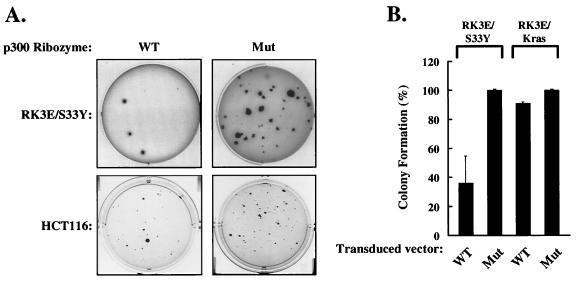Figure 4.
p300 ribozyme suppresses β-catenin- but not K-ras-associated transformation. (A) Colony formation assay of β-catenin-transformed cells (RK3E/S33Y) or human colon cancer cell line HCT116 (containing a β-catenin mutation) stably transduced with the retroviral vector encoding the active p300 ribozyme (WT, Left) or the scrambled-arm mutant (Mut, Right) that served as its negative control. Similar suppression was observed in HCT116 cells for active p300 ribozyme (69 ± 14 colonies) compared with mutant, inactive p300 ribozyme (139 ± 37 colonies; P > 0.037). In RKO, a human colon cancer cell line containing wild-type APC and β-catenin with no evidence of TCF deregulation; active vs. inactive p300 ribozyme yielded similar numbers of colonies (67 ± 37 vs. 74 ± 42; P > 0.853). (B) p300 ribozyme suppresses colony formation of β-catenin-transformed cells (RK3E/S33Y), but not K-ras-transformed cells (RK3E/Kras), in a soft agar assay. The RK3E/S33Y and RK3E/Kras cells were transduced with retroviruses expressing wild-type or mutant p300 ribozyme as in A. For the colony-formation assay, 104 cells were used. After incubation for 3 weeks, the cells were fixed with glutaraldehyde and stained with methylene blue. The colony number of the cells transduced with mutant p300 ribozyme was arbitrarily set as 100, and the percentage of reduction of the colony number was calculated accordingly. The mean numbers of colonies from three independent experiments ±SD are shown.

